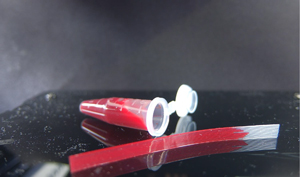Lab on a Stick brings miniaturised clinical testing for fast detection of antibiotic resistance
Release Date 23 August 2016

Patients waiting for lab results could benefit from new miniaturised technology being developed at the University of Reading and Loughborough University.
The technology can be used for a variety of tests ranging from overnight detection of anti-microbial resistance to blood tests that can rapidly diagnose a heart attack.
The idea behind Lab on a stick is to combine the simplicity of a dipstick with the benefits of the latest miniaturised testing technology known as ‘microfluidics’ using tiny test tubes about the size of a human hair, that make lab analysis portable and up to 12 times quicker than current microbiological tests. Dipstick tests are routinely used in a variety of scenarios ranging from soil pH strips for the garden to pregnancy tests.
Up to 12 times quicker than current microbiological tests
Dr Al Edwards, Associate Professor in Biomedical Technology at the University of Reading said:
“This is the latest demonstration of our exciting new technology called microcapillary film. Many researchers across the world have shown how miniaturising lab tests can speed them up using microfluidic Lab-on-a-Chip devices. But these are too expensive to be useful outside the laboratory.
“What we have done is to develop a low cost way of making thousands of miniature test tubes, so that we can use them for many important applications. Lab-on-a-Stick shows yet again how versatile the technology is.”
In a paper published in the journal Lab on a Chip, authors from the University of Reading and Loughborough University used three cellular tests to demonstrate the range of potential applications. ABO blood typing showed how simple blood tests can be minaturised and results recorded using a simple digital camera.
Anti-microbial resistance
Anti-microbial resistance was measured with Salmonella samples typical of a common urinary tract infection, which can be hard to treat with antibiotics because antibiotic resistance is so common yet lab testing takes at least two days.
Tests for bacterial identification were achieved in only four hours, and demonstrated the advantage of using the microcapillary film by allowing 10 tests per sample to be performed using a single test strip.
Dr Nuno Reis, Lecturer in Chemical Engineering at Loughborough University and co-author of the paper added:
“This is a major step towards miniaturising complex, routine microbiological and clinical tests that cannot at the moment be performed outside of the laboratory setting.
“Our secret is simplicity. We have shown how microengineered film material made from a very transparent plastic with special optical properties, makes it easy to perform laboratory tests without lab equipment. Previously, we showed how a portable Lab-in-a-briefcase made it possible to record blood test results with the assistance of a simple smartphone.”
The full paper is available at http://pubs.rsc.org/en/content/articlelanding/2016/lc/c6lc00332j
The technology is also being developed to speed up test times for heart attacks (see associated release here: http://www.reading.ac.uk/news-and-events/releases/PR616297.aspx)